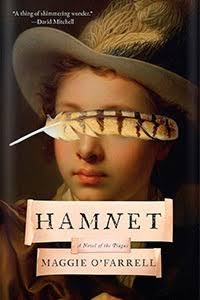Anyone looking for a pattern to my reading would be hard-pressed to find one (unless I listed the textbooks for my educational leadership studies. Don't worry. I won't.)
In this new year, I have enjoyed such a variety of books. One that I was most eager to read was Maggie O'Farrell's Hamnet: A Novel of the Plague. Set in Stratford-upon-Avon, the book moves back and forth between the years Shakespeare spent in London, leaving his wife and children behind, and the earlier years when as a young man, he met Anne Hathaway (called Agnes in the book, as her father addressed her in his will). The author drew upon the scant historical details we know to weave a good story.
Part of the story is told by Shakespeare's only son Hamnet, whose twin Judith falls sick while he is alone in the house with her. All his efforts to find help fail. His father is in London, working at his craft at the Globe Theatre; his mother is out gathering plants for the healing for which she is best known. Judith recovers; Hamnet does not.
The story stands alone for readers without a familiarity with Shakespeare, but it is enriched when you know a little about the man considered by so many the greatest writer who ever lived. O'Farrell doesn't use gimmicks in the story. Instead, she puts together what is essentially a love story and a family story. Readers who have visited Stratford-upon-Avon and toured the Shakespeare family home will find the book especially appealing. The author's treatment of the small detail from his will that causes the most speculation, leaving his wife the "second best bed" is handled credibly too.
Another favorite this year is Anxious People, by Fredrik Backman, author of A Man Called Ove. This is the story of a bank robbery that goes wrong due to the ineptitude of the would-be robber. It turns into a hostage situation with a group of people attending a real estate open house in an apartment upstairs from the bank. The story shifts perspectives several times, from the robber to a woman waiting, she says for her husband to park the car, to one of the women caught in the apartment who apparently goes to open houses with no intention at all to purchase, mainly interested in the view.
One of the things I like best is that at one point toward the end of the story readers will need to go back to the beginning to check to see some of their earlier misperceptions. The ensemble cast of characters--the hostage taker, the hostage, and even the father-son team handling the case--live up to Backman's standards in his earlier books.
I try to revisit a classic every year, and this year the choice was made by my book club. We had a great discussion of DuMaurier's Rebecca last year and decided on Wuthering Heights, by Emily Bronte. This was a ninth grade favorite. Now I wonder how I read it when I was fourteen. It is dark, but fascinating. I suspect that the movie version with Timothy Dalton as Heathcliff that came out that year was part of my fascination. (The scene I remember most is his return after the long disappearance, wearing a green velvet suit, the camera moving from his boots to his face. Ah! What a transformation.) The movie took a few liberties with dialogue, but I still remember Catherine's "I am Healthcliff" speech. I enjoy the points of view of Mr. Lockwood and the housekeeper Nelly Dean, holding the strange main characters at just enough of a distance to intrigue.
I may have to read Lin Haire-Sargent's reimagining of the Story: H: The Story of Heathcliff's Journey Back to Wuthering Heights. I read it years ago and it sent me back to Jane Eyre as well.
Another powerful read this year was Shuggie Bain, by Douglas Stuart. Set in Glasgow in the 80’s, this book reminded me a little of Frank McCourt (Angela’s Ashes). The title character is the youngest son of a cabbie who moves his wife and the children out of her parents’ home to a house in a declining area and abandons them. The older children make their escape to independence, but young Shuggie feels responsible for his alcoholic mother, believing that if he just loves her and looks after her, he can save her. Not a feel-good story, but very powerful and moving.Another timely work of nonfiction is Inheritance, by Dani Shapiro. A writer herself, Shapiro submitted her saliva to Ancestry.com on a whim and discovered that the man who raised her wasn’t her biological father. She had always felt different, looked different, but had strong family connections, especially to her father. The story is very much her search for her identity.







